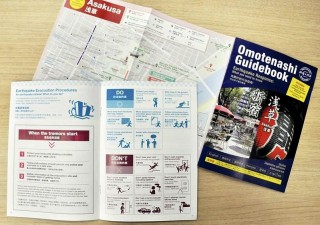Loading
Search
▼ Local organizations aim to help foreigners during disasters
- Category:Event
A growing number of local organizations in Tokyo are seeking to help foreigners at times of disaster by conducting drills or creating handbooks.
Local governments and tourism associations have prepared handbooks for disaster prevention written in foreign languages to help disseminate guidance for smooth evacuations among foreign visitors to Japan.
They are also conducting various activities, including a disaster drill involving foreigners.
Foreign students participated in a disaster drill in March in Tokyo’s Asakusa, Taito Ward, playing the role of tourists. Upon their arrival at the temporary shelter at the Asakusa Public Hall, staff taking care of evacuees gave them a booklet and emergency food.
The shopping district associations of Asakusa and Shinjuku joined hands to create 50,000 copies of the booklet in November last year.
The A5-size booklet shows actions that should be taken and other points to note if an earthquake occurs. It contains both English and Chinese phrases, and the Japanese translations, that are useful at times of disaster, such as “Can I use a phone?” It also contains maps showing evacuation areas.
The booklets are placed at hotels, shops and temporary shelters in Asakusa, and shops and some public facilities in Shinjuku, so they can immediately be delivered to foreign tourists in the event of a disaster.
Asakusa this year started preparing halal foods as emergency provisions for Muslim evacuees at some temporary shelters. The Asakusa Tourism Federation plans to make it possible to find evacuation shelters by using an app called 365 ASAKUSA, which was developed by the federation for tourists.
“I want to make disaster information known to many foreigners by combining it with information on sightseeing,” said Kunio Iijima, assistant manager of the federation’s secretariat.
The Ginza district in Chuo Ward, which attracts many foreign tourists partly for “bakugai” shopping sprees, plans to distribute a leaflet about disaster prevention written in English and Chinese at an emergency drill to be held in August.
“I want to help foreigners have an interest in disaster prevention by showing them what we’re doing,” said Ren Mori, 84, a leader of the Ginza district’s disaster prevention unit.
Arakawa Ward concluded an agreement with a Japanese language school in the ward in March over cooperation regarding foreign languages in the event of a disaster. The ward is also considering holding a drill in the future involving foreign students studying in Japan.
Local governments and tourism associations have prepared handbooks for disaster prevention written in foreign languages to help disseminate guidance for smooth evacuations among foreign visitors to Japan.
They are also conducting various activities, including a disaster drill involving foreigners.
Foreign students participated in a disaster drill in March in Tokyo’s Asakusa, Taito Ward, playing the role of tourists. Upon their arrival at the temporary shelter at the Asakusa Public Hall, staff taking care of evacuees gave them a booklet and emergency food.
The shopping district associations of Asakusa and Shinjuku joined hands to create 50,000 copies of the booklet in November last year.
The A5-size booklet shows actions that should be taken and other points to note if an earthquake occurs. It contains both English and Chinese phrases, and the Japanese translations, that are useful at times of disaster, such as “Can I use a phone?” It also contains maps showing evacuation areas.
The booklets are placed at hotels, shops and temporary shelters in Asakusa, and shops and some public facilities in Shinjuku, so they can immediately be delivered to foreign tourists in the event of a disaster.
Asakusa this year started preparing halal foods as emergency provisions for Muslim evacuees at some temporary shelters. The Asakusa Tourism Federation plans to make it possible to find evacuation shelters by using an app called 365 ASAKUSA, which was developed by the federation for tourists.
“I want to make disaster information known to many foreigners by combining it with information on sightseeing,” said Kunio Iijima, assistant manager of the federation’s secretariat.
The Ginza district in Chuo Ward, which attracts many foreign tourists partly for “bakugai” shopping sprees, plans to distribute a leaflet about disaster prevention written in English and Chinese at an emergency drill to be held in August.
“I want to help foreigners have an interest in disaster prevention by showing them what we’re doing,” said Ren Mori, 84, a leader of the Ginza district’s disaster prevention unit.
Arakawa Ward concluded an agreement with a Japanese language school in the ward in March over cooperation regarding foreign languages in the event of a disaster. The ward is also considering holding a drill in the future involving foreign students studying in Japan.
- May 25, 2017
- Comment (0)
- Trackback(0)


